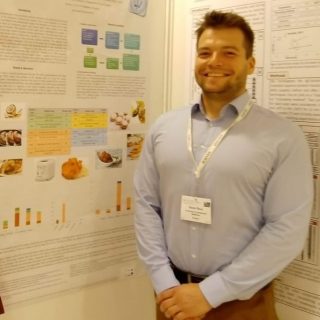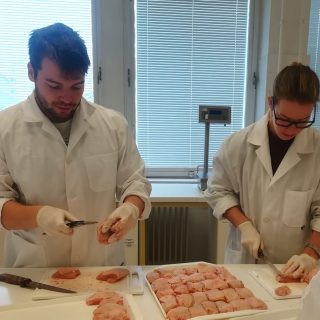During the university years, it is important to keep track of what has happened to those who graduated before us, how their careers developed, where they are 5-6 years after graduation. But it can be just as important to keep an eye on those who are right in front of us along the way, watch their first steps, learn from their mistakes, and follow the good examples. In this article, we talked to an unusual graduate, a veterinarian who has never wanted to cure animals. So why is he here? The following lines shed some light on that.
Dániel Pleva graduated in 2016 from the University of Veterinary Medicine Budapest, he is currently a PhD student here. Veterinary education, including the PhD degree, was a compromise for him, between his parents’ wishes and his attraction to a teaching career.
What was your motivation when you applied to UVMB? As far as I know, this was not a childhood dream for you (as for many it is), to be a doctor, a veterinarian.
Indeed. I wanted to be a researcher when I was a child, I was interested in every type of science, especially mycology and fungi. I went to an eight-year structured high school and had some very good teachers, whom I loved and respected. I was so interested in their work that I decided to become a teacher. For eight years I planned to be a teacher, major in mathematics and chemistry, I even started my admission process to university according to this. Eventually, I decided to go to vet school because of my parents.
So, in the end, you applied to the University of Veterinary Medicine Budapest because of your parents. Are they veterinarians?
Yes, both of them. I never planned to become a vet, but I made this compromise with my parents. I knew if I wanted to be a teacher or a researcher, I had to complete my PhD. This was the agreement, that I became a veterinarian even though I am not.
Which one do you want to be, a teacher or a researcher? Which area are you interested in?
I think I’ve taken a path that others haven’t really. I knew I wanted to work in state veterinary or research. When I graduated in February, I knew my PhD studies would start in the fall and I had a half-year off. I didn’t want to start working in another field, so I applied to the National Food Chain Safety Office (NÉBIH) to get an internship. It didn’t work out, they weren’t hiring at that time, there were layoffs.
Why did you choose state veterinary medicine?
I’ve always loved conformist things. Not specifically the rules, but when something works. I think it is important that an authority like this works and it works well, there must be regular inspections. I felt some uncertainty in this area lately, things weren’t completely done, I was interested to see what I would do differently. The 11th practical semester was very helpful because I was able to experience forensic health work. It was really good to be there.
Then, in fact, the research career is attractive to you, but so is state veterinary medicine. How compatible do you think these two areas are? Can you manage to do both?
The two are not fully compatible because state veterinary medicine is a full-time job. I can’t teach and do the research part for let’s say three days and then check out the cattle farms for two days. I’m a little sad about that because if it didn’t require a full person, maybe more of us would choose this field.
And what about the research work? Why are you interested in this area?
Researching at a university is always good. For example, if someone works for a pharmaceutical company, they will be told what to research, what outcome is expected from them. Here I think, or hope, that if I figure out that I’m working with meat now, but would be interested in something else in the future, my hands won’t be tied. This is important to me, I want to work with a lot of different things.
You have an interesting career. How do you remember your student years, knowing from the very beginning that you didn’t want to be a clinical vet?
My classmates knew this from the beginning, and they always laughed at it. When we had lots and lots of clinical subjects, I always volunteered for the assignments, keeping in mind that I would never do that later anyway, so let me try it now. When I had to perform a trepanation, I did it because I was sure I would never do that again. The others, who wanted to be clinical veterinarians, attended clinics next to university classes, but I didn’t, I have to admit, it was a little weird.
What is life like here at UVMB as a PhD student? How is PhD education conducted?
In the first two years, there are “THE” subjects that are mandatory to do and there are electives. You conduct a research, and then you write your dissertation at the end. In the meantime, two articles in foreign languages and one in Hungarian must be published during the 4 years. This part is not so easy.
My first year was quite convenient, I had only a few classes, only on Mondays. The research was slower than, I was getting busier from the second year. It is good that there are harder and easier days, no fixed working hours, only the number of working hours you have to complete, but it’s your choice when. I have been just hired as a part-time research assistant, so I get paid and the practice is useful.
If I know well food hygiene is your research topic. More closely, what do you exactly do?
 I am at the Department of Food Hygiene, investigating the impact of frying and cooking procedures at home on the chemical and microbiological safety of poultry meat. We examine how much carcinogen is produced by heat treatment and how salmonella is killed by it. We are looking for a golden mean so that we don’t get sick from food, but also don’t starve to death.
I am at the Department of Food Hygiene, investigating the impact of frying and cooking procedures at home on the chemical and microbiological safety of poultry meat. We examine how much carcinogen is produced by heat treatment and how salmonella is killed by it. We are looking for a golden mean so that we don’t get sick from food, but also don’t starve to death.
Do you want to stay at the university after you finish your PhD?
It would be nice to try another year of teaching, possibly in Canada, but I would stay in the long run. I would like to teach subjects related to food hygiene, maybe do a specialization. I even chose my apartment in this area when I applied for my PhD. I had already known that I wanted to stay here.
Do you consider your situation to be unique? Do you think most students plan to have a clinical vet career, or are there others like you? What do the 5.5 years at the university prepare you for?
I think the university provides the basics for both a clinical and a state vet career, but it is not really possible to practice or get a job as a state vet if you are not doing something besides your studies. Here, we get a basic knowledge that is useful for every career path. I am very pleased that we have this system, because for example in the Czech Republic the two areas are trained separately. The state vets do not receive the same degree as the practising vets. I think our system is better because there are a lot of perspectives in the veterinary career, from the pharmaceutical sector to the PhD studies, you can do anything. During our studies, we get a strong foundation for everything and we can get started with that. But let me add that whoever gets out of here cannot work on his own yet, you need to practice and gain professional experience.
You mentioned that you wanted to stay at the university. Do you have a plan B?
If my plans with the university don’t work out, I’d look for something else, I guess. But so far there is no other place in my mind. I think I could get a job, especially after I have completed the PhD. Basically, I can’t imagine myself working in the private sector, the academic atmosphere is calmer. Some people prefer earning a lot of money, but for me working in a calm and predictable environment and having free time is much more important.
